Natural anxiety relief
The fear, worry, and nervousness that comes with anxiety can be hard to manage. Therapy and or medication could help, especially if you’re dealing with an anxiety disorder that’s interfering with your daily life. Some anxious thoughts or feelings, however, come and go as a normal part of the ups and downs of life. Still, you can manage these feelings better with some natural remedies for anxiety. Here are the home remedies for anxiety relief that could help.

Drink chamomile tea
Chamomile’s compounds may help ease anxiety symptoms, according to a small study published in 2016 in the journal Phytomedicine. It notes that “oral intake of pharmaceutical-grade chamomile is safe, with few mild side effects that are statistically and clinically indistinguishable from placebo.” Even better, the study explains that there weren’t any signs of side effects like weight gain, which can occur with some traditionally-prescribed anti-anxiety medications. (Weight gain can occur with some anti-anxiety medications, although this doesn’t usually happen with most current medications.) However, as is common with studies about alternative and natural therapies, the researchers explain that more work needs to be done to further examine its benefits for natural anxiety relief. Still, it can’t hurt to sip on some chamomile tea; while you’re at it, here are more ways to use tea for what ails you.
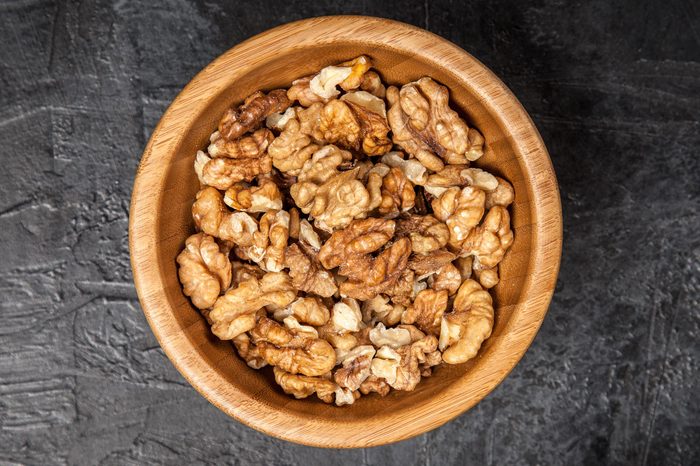
Get your daily dose of omega-3s
There is some evidence that omega-3 fatty acids are one of the natural remedies for anxiety. A systematic review and meta-analysis published in 2018 in the journal JAMA Network Open assessed the potential benefits of omega-3 polyunsaturated fatty acids (PUFAs) for anxiety. While its authors note that more clinical trials should be conducted, their information is the “…first meta-analytic evidence, to our knowledge, that omega-3 PUFA treatment may be associated with anxiety reduction.” Canned fatty fish, such as tuna and salmon, walnuts, and flaxseeds are all great sources of omega-3 fatty acids. If you’re not a tuna fan, here are some omega 3-rich foods for people who don’t like fish.
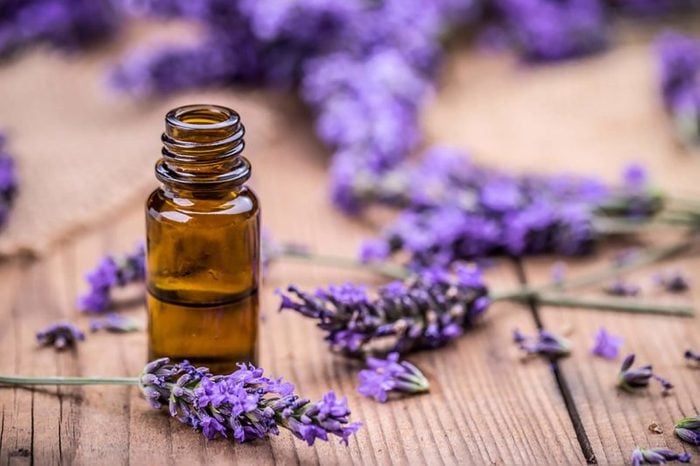
Breathe in lavender
You’ve probably heard about lavender oil as one of the many natural remedies to reduce anxiety. But is it effective? A 2016 issue of the journal The Mental Health Clinician states that the essential oil of lavender has a “favorable safety and efficacy profile.” Therefore, it might be useful in the treatment of anxiety symptoms. Try putting a few drops of lavender essential oil on your pillow or in your bath, or add a few drops to a cup of boiling water and inhale for quick, natural anxiety relief. Don’t miss the signs you are headed for a nervous breakdown.
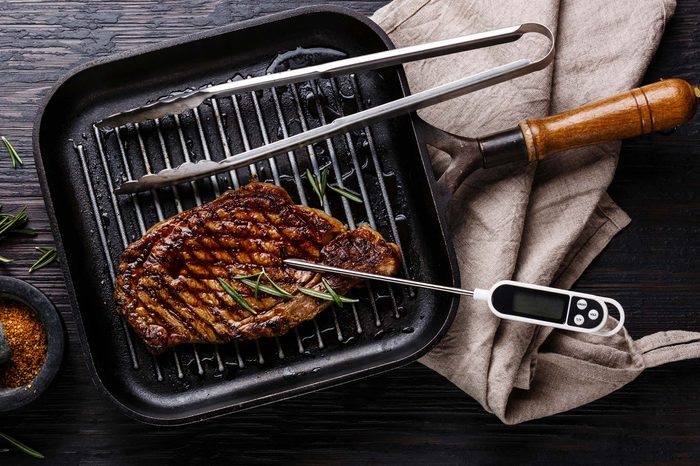
Add L-lysine to your diet
L-lysine is an amino acid and one of the building blocks of your brain’s chemical messengers called neurotransmitters. Some smaller studies have linked L-lysine to a reduction of anxiety symptoms, including one in the journal Biomedical Research. It found that a combination of L-lysine and L-arginine was “a potentially useful dietary intervention in otherwise healthy humans with high subjective levels of mental stress and anxiety.” Protein-rich foods like red meat, fish, and cheese contain L-lysine. If you like cheese, then you’ll want to know about the 6 healthiest kinds of cheese you can eat.

Get some sunlight
Head outdoors to naturally increase your vitamin D levels and decrease anxiety. Doing so may be a natural way to calm yourself, according to information presented in a 2018 issue of Behavioral Sciences. The journal’s authors drew on the growing number of studies attempting to link natural, outdoor environments to stress reduction. Ultimately, they concluded that a variety of research points to a positive association between the two. However, they make it clear that a host of variables may drive the natural anxiety relief. For example, personal feelings about nature, differing views on what makes a natural environment pleasing, and other mental health conditions are just a few considerations. A 2019 study in Scientific Reports found that people who spent 120 minutes or more per week in nature were more likely to report being in good health or having high well-being compared with those who didn’t spend any time in nature. (Read these 16 quotes about anxiety that will help you cope a little better.)

Exercise to combat stress
Get moving to help reduce your anxiety. After all, the Anxiety and Depression Association of America states that even just brief walks lasting about 10 minutes may boost mood. It makes sense; exercise produces endorphins, chemicals which are your body’s natural painkillers. In turn, you’re better able to sleep, which can diminish stress. Exercise can also improve overall cognitive function and reduce fatigue. If you think you’d rather watch grass grow than hit the gym, take these tips into consideration to learn to love exercise.
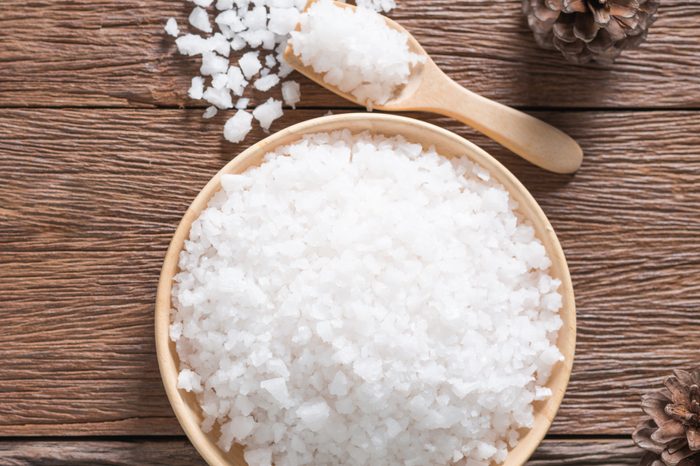
Take a hot bath with Epsom salts
First, a hot bath is always calming. Second, adding some Epsom salts to the water may help boost your mood and act as natural anxiety relief. These salts contain magnesium sulfate, which may have anxiety-fighting benefits. For example, information published in a 2017 issue of the journal, Nutrients, notes that “…there is suggestive but inconclusive evidence for a beneficial effect of magnesium supplementation in mild anxiety.” As is the case with a lot of research about natural remedies, this one also points to the need for further investigation.

Cut out (or down) caffeine
You probably head for your coffee maker or local cafe every morning. However, if you’re struggling with anxiety, you might want to re-evaluate your caffeine habit. The Mayo Clinic notes that caffeine may lead to sleep problems which affect mood and in turn, may worsen depression. Anxiety and depression often occur together, the clinic adds, saying that “caffeine can worsen anxiety.” Therefore, try natural remedies, such as chamomile tea, or try upping your water intake. This could be the key to solving your morning anxiety.

Avoid these foods
- Caffeine, alcohol, and added sugars. The Mayo Clinic states that alcohol and caffeine, for example, can worsen anxiety.
- Deficiencies in magnesium, vitamin B12, and zinc have been linked to symptoms of anxiety disorders. Vegans and vegetarians, in particular, should watch their B12 intake, as the vitamin is only found in animal products.
- Studies link an unhappy gut with an unhappy mind, so avoid eating difficult to digest foods like processed meals, foods high in saturated fats, and fried foods. Instead, the Mayo Clinic suggests healthier options like fruits, fish, and vegetables.
- Finally, don’t let yourself become so hungry that your blood sugar drops, which can lead to an anxiety attack.
Here’s a specific list of foods that can cause anxiety.
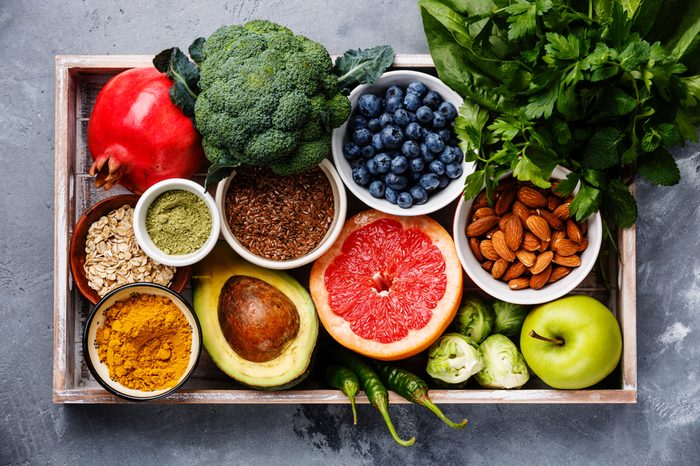
Eat these foods
A healthy diet and lower anxiety levels seem to go hand-in-hand. Information from Harvard Medical School refers to something called “nutritional psychiatry.” In other words, your brain responds to the foods you eat. This can affect your mood. Cut way down (or completely eliminate) high-sugar diets and processed foods. Here are some healthy suggestions for natural anxiety relief:
- Blueberries and peaches contain nutrients that relieve stress and have a calming effect.
- Whole grains are rich in magnesium and tryptophan, an amino acid that your body converts to serotonin. Serotonin is known to calm and improve your mood.
- Oats also increase serotonin production and are high in fiber, which helps prevent blood sugar spikes that affect mood.
- Avocados, eggs, milk, and meat are all packed with B vitamins that can help prevent anxiety.
- Foods that help regulate and lower the stress hormone cortisol include foods rich in vitamin C, like oranges, omega-3 fatty acids, and magnesium-rich foods like spinach and other dark leafy greens. Indulge every once in a while in dark chocolate, which also helps lower cortisol.
